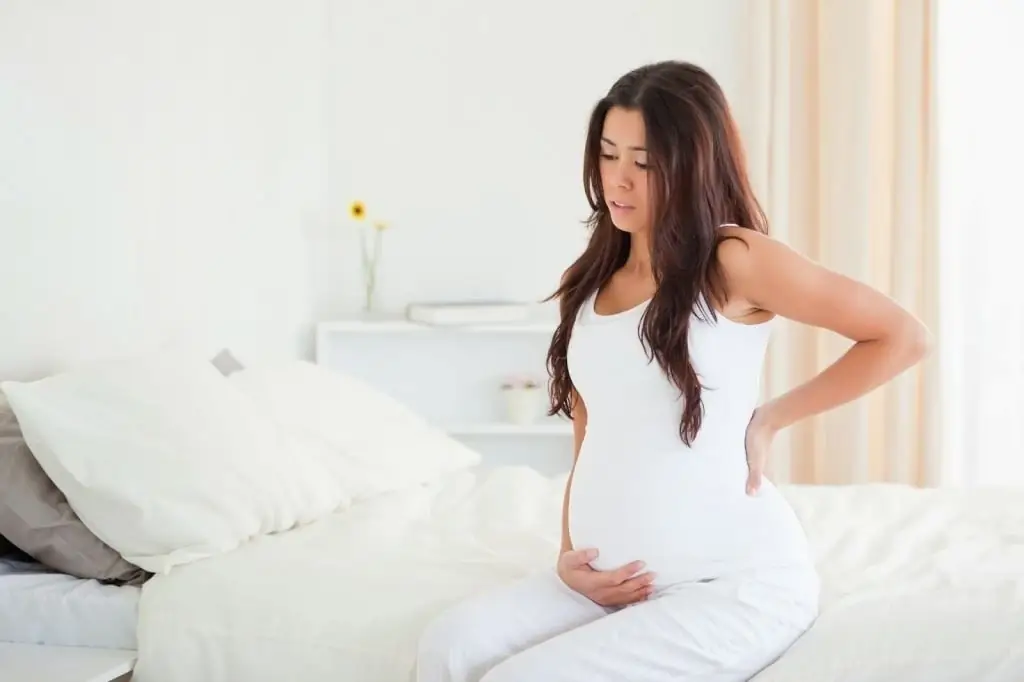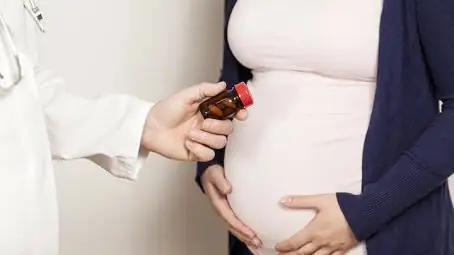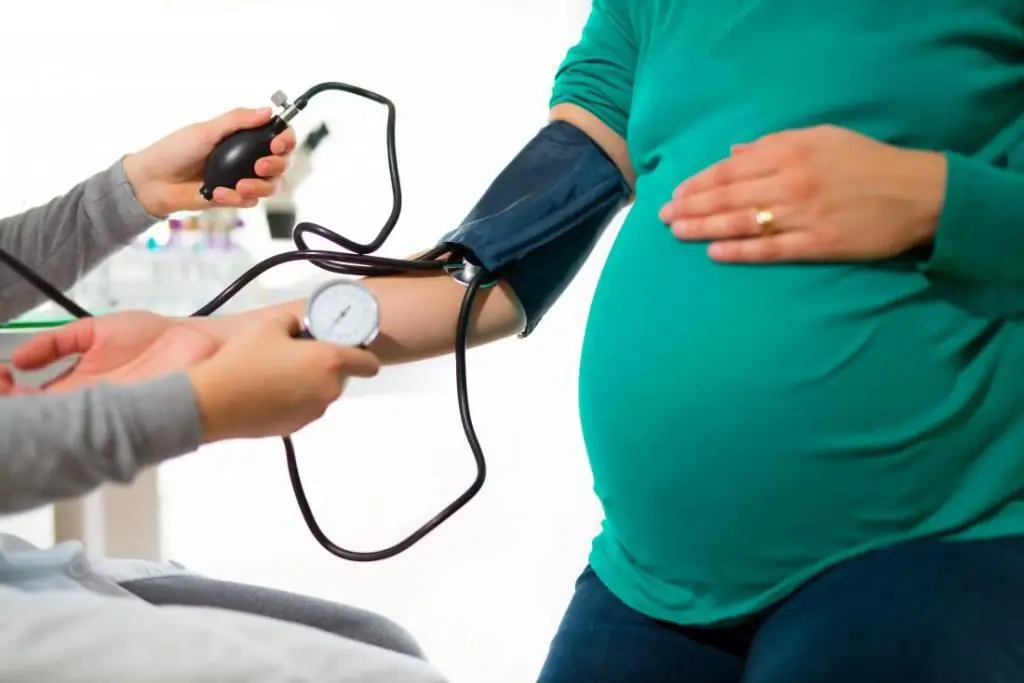2026 Author: Priscilla Miln | miln@babymagazinclub.com. Last modified: 2025-01-22 17:55:27
The work of the female body during the period of bearing a child occurs in an extreme mode, because its main goal is the maintenance and development of the fetus. The he alth of the expectant mother at this moment is very fragile. And poisoning during pregnancy harms both the body of the mother and the child. In this case, the main thing is to quickly take action and get a course of treatment.

Frequent poisonings
During pregnancy, a woman lives her normal life: she works until a certain period, constantly goes to public places, uses transport. Girls in position are no different in this regard from others, therefore, the reasons why poisoning occurs, like everyone else:
- Medicines.
- Poisons and toxins that enter the body with food.
- Gases.
- Industrial and household chemicals.
Frequent and common poisoning during pregnancy - food. In addition to us, bacteria and microbes love food, both harmless to the body and very dangerous. The digestive system at this time is prone to food poisoning.

Types of poisoning
Having broken into the gastrointestinal tract, dangerous microbes begin to live there: eat, multiply, and, as a result, release toxins that poison the body. The most common and dangerous diseases include:
- Botulism. Active and hardy microbes called "botulism clostridia". Since they do not need oxygen for life and development and the production of poison, the habitat is canned food, milk, fish, sausage and mushrooms. By the way, mushrooms can do the most harm, especially when poisoning during early pregnancy, because the toxins they contain can cause terrible harm to the baby, because they have the ability to cross the placenta.
- Salmonellosis. You can get infected through infected eggs, there is an opinion that this disease can only be contracted by eating chicken eggs, and quail eggs are harmless. Yes, this is true in the wild, but today, quail eggs grown on a farm are sold on store shelves, where quails can also get sick with salmonellosis due to low immunity.
- Staphylococcus aureus is a common infectious disease caused by dairy or meat products. Infection occurs when storage or handling standards are not observed, or in case of contact with already sick employees.

There is no guarantee that you will not get sick with any infectious disease, but the chance of infection will be much reduced if you followelementary hygiene standards, boil food when you can and do not eat previously unverified food supplier companies.
Causes of poisoning
As noted earlier, the most common is food poisoning during pregnancy caused by staphylococcus aureus. Products that are improperly stored in an unsuitable place, unpasteurized milk, or from an animal with mastitis, violation of sanitary standards of workers - these are all conditions under which this infectious disease can be obtained.
The main cause of salmonellosis is eggs that are raw or undercooked. With a disease, all digestive organs from the stomach to the large intestine are affected.
Sausage, milk, even vegetables and fruits (of exotic origin) can be carriers of any infection. For long-term storage of products, they use chemicals that may be invisible, but not for a pregnant girl, and they are quite capable of causing poisoning.
Poisoning: what to do?
During pregnancy, the manifestation of toxicosis and poisoning occur completely differently. To prevent the serious consequences of infection, you should immediately take activated charcoal. Do not worry, it is harmless at any stage of pregnancy for both mother and baby.

If the poisoning is moderate and severe, gastric lavage is performed, but you should not do this unpleasant procedure without a doctor's supervision. While washing behind a pregnant womanobservation is carried out: control of arterial pressure and the baby. Self-medication can lead to premature birth, and even worse, abortion.
Gastric lavage severely dehydrates the body, so you need to immediately restore the lost fluid. It can be tea, dried fruit compote or saline solution. With a decrease in pressure, it is recommended to introduce caffeine. If vomiting does not stop, and dehydration only intensifies, the patient is injected intravenously with a solution of soda with s alt. They can prescribe antibiotics, but most of the time they don't.
After poisoning during pregnancy, what to do? Of course, a woman in a position after this trouble will have to stick to a diet: a couple of days only tea, broth and minimally reduce the amount of food. The diet gradually increases: you can have a little bread, crackers, a little light porridge, steamed cutlets.
Prohibitions
There is a specific list of foods that are strictly forbidden to eat in case of poisoning and when recovering from it:
- Alcoholic and carbonated drinks.
- Various spices, condiments or spices.
- Dishes of different smoking.
- Mayonnaise, ketchup, mustard and any other sauces, spicy or not.
With mild poisoning, the expectant mother needs to consume light food, absorbent medicines and a lot of water and liquids. In a day or two, you will feel much better.
Effect on a child with staphylococcal poisoning
In acute or severe cases, poisoning during pregnancy can result in its termination,which will be caused due to a decrease in the woman's blood pressure and dehydration of her body. But in 90% of cases, serious consequences can be avoided, and the recovery period is easy and painless.

Poisoning during late pregnancy is treated in the same way as usual. The patient is prescribed a diet, sorbents and replenishment of lost fluid. If the gestational age is more than 36 weeks, then Magnesia can no longer be prescribed, but other drugs that improve blood circulation in the placenta can be used.
Risk for baby
The question that torments many expectant mothers: "What is the danger of poisoning during pregnancy?". Over a long period, complications may appear that will leave a mark on the child:
- Poor oxygen supply.
- Placental exfoliation.
- Begin early labor.
- Slow development of the unborn child.
- Bleeding in the uterus.
- Mismatch between baby's weight and due date.

But do not worry ahead of time, this is only in the worst case. In a difficult situation, which is accompanied by complete intoxication of the body in conjunction with pathologies during childbearing.
Dangerous botulism
Poisoning during pregnancy with botulinum toxin can be fatal. At the slightest suspicion of the appearance of this infection in the body of a woman during the period of bearing a child, it is necessaryhospitalize her immediately. With this infection, the leading methods of cleaning the body are used:
- gastric lavage;
- anti-botulinum serum;
- enema;
- sorbents.
In neglected forms, when nothing brings a positive result, the patient is prescribed penicillin antibiotics. For example, if there is a suspicion of pneumonia. Based on the medical results of the examination of the state of the body, funds are prescribed to increase and strengthen the immune system.
In case of unstable work of breathing, they are treated with oxygen, namely its injection under high pressure. If there is a need, then a tube is inserted into the trachea, but this option occurs only if the patient needs ventilation.
What can be done in case of poisoning?
When pregnant after poisoning, you should not immediately load the stomach with heavy food. It is better to start with vegetable soups and broths. Sweet black tea is allowed, but in small portions. After a couple of days, you can cook stewed vegetables or low-fat, light cereals.
Within ten days after infection is strictly prohibited:
- Soda.
- Unheated fruits and vegetables.
- Fish and seafood.
- Meat and sausages.
At the end of the recovery period, consult a therapist about prescribing vitamins for you, because during an illness the body not only fought toxins, but also lost useful substances, which it is now experiencing an acute shortage of.
Poisoning is easier and easier to avoid. itis of particular importance when you are responsible not only for your life, but also for your unborn child. It is on the fragile female shoulders that this share falls. Much better to be careful:
- Check ingredients and expiration date before buying.
- Don't try homemade pickles or canned food.
- Cook fruits, vegetables, meats and any other foods.
- Don't continue eating if the taste bothers you.
And most importantly - at the first sign of food poisoning, do not sit idly by, but contact the clinic. Remember that you are not only responsible for yourself.

Symptomatics
The incubation period varies from half an hour to a day. The disease begins abruptly and suddenly, when it seems that everything is fine. After a certain period of time, after eating low-quality food, you can notice the following symptoms of poisoning during pregnancy:
- vomit;
- nausea;
- Pain in the epigastric zone;
- gas, bloating;
- temperature;
- diarrhea.
For some, food poisoning is not accompanied by fever. But, of course, a deterioration in well-being is noticeable: weakness, pale skin, frequent heartbeat. The temperature does not exceed 39 and is noticeable for no more than 24 hours.
Different pathogens have different symptoms. For example, staphylococcus aureus - frequent debilitating vomiting and pain in the stomach, the stool is not disturbed here. Possible deterioration in well-being, lossconsciousness and the appearance of convulsions.
Clostridia - loose stools with blood. The condition is critical, there may be a violation of the spleen, liver, heart or lungs. Chills, dizziness, high fever and weakness.
Klebsiella - diarrhea with a pungent odor. Weakness, which, along with loose stools, lasts up to 3 days, and fever.
As a result, it will not be superfluous to repeat that poisoning during pregnancy adversely affects not only the woman, but also the child. Take care of yourself and be attentive to your he alth.
Recommended:
Thyrotoxicosis and pregnancy: possible causes, symptoms, treatment, possible consequences

A woman experiences multiple changes in her body during pregnancy. On the hormonal side, the biggest changes occur. Due to improper rearrangement of the hormonal background, thyrotoxicosis may occur, and pregnancy will pass with pathologies
Hypertension during pregnancy: causes, symptoms, prescribed treatment, possible risks and consequences

Many women have heard of hypertension during pregnancy. In particular, those mothers who carried more than one child under their hearts know exactly what they are talking about. But at the same time, not everyone knows about the serious consequences, if you ignore the first alarming "bells" of this problem. But this phenomenon is not so rare among pregnant women. And so it can be considered a problem
How dangerous is a cough during pregnancy. Cough during pregnancy: treatment

In this article I would like to talk about how dangerous a cough is during pregnancy and what needs to be done to cope with this symptom. You can read about all this and much more about what is useful in this text
Rotavirus during pregnancy: features of treatment, prevention and possible consequences

Rotavirus during pregnancy is not uncommon. Of course, the expectant mother should take care of herself, but this possibility cannot be completely ruled out. Therefore, today we will talk about the main ways of infection, the features of prevention and treatment of expectant mothers
Hypotension during pregnancy: possible causes, symptoms, treatment, normal pressure during pregnancy, advice and recommendations from a gynecologist

What is hypotension during pregnancy? Is it a simple ailment, or a severe pathology that requires immediate medical attention? That is what we will talk about today. During the period of bearing a baby, every woman is faced with various ailments, because the body works "in three shifts", and gets tired in order. At this time, chronic diseases are exacerbated, and "sleeping" ailments are awakened, which could not be suspected before pregnancy

